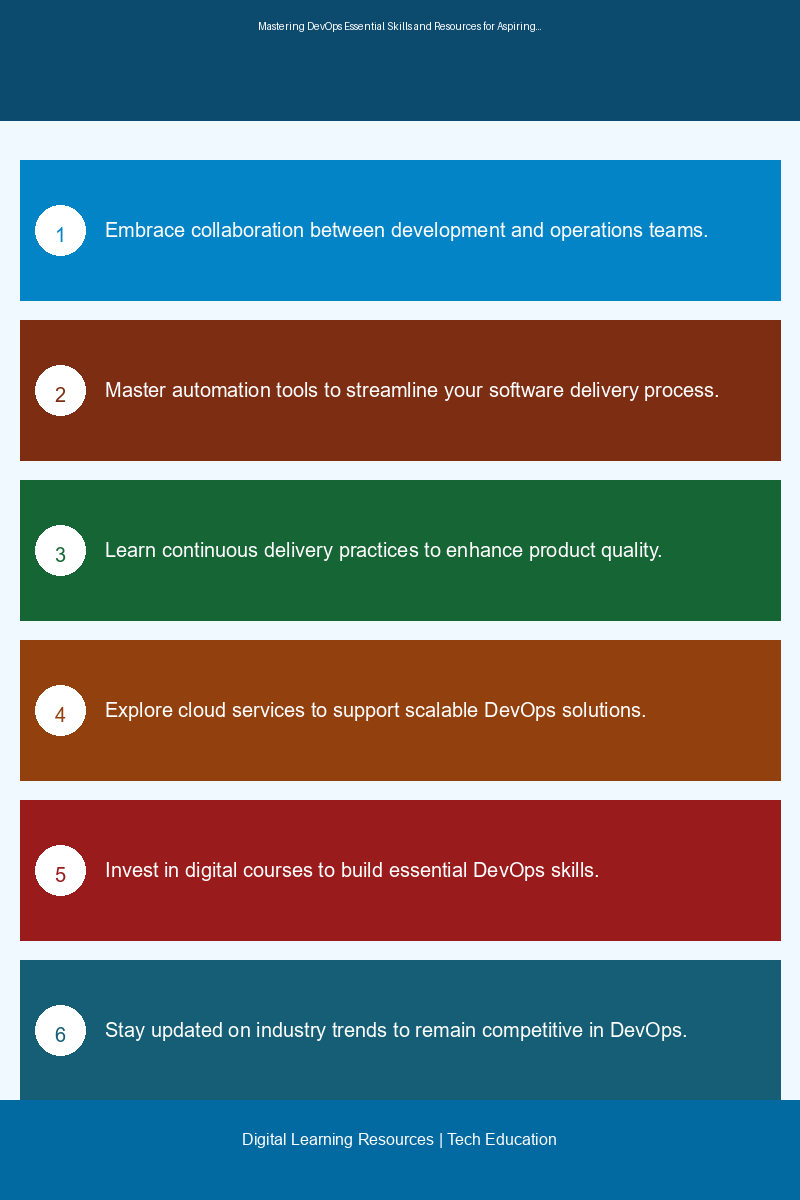Key Takeaways: This blog post explores the collaborative environment of DevOps, the critical practices of automation and continuous delivery, educational paths for aspiring DevOps engineers, and the future of the industry. Discover actionable insights and resources to enhance your career in tech.
Introduction
In the fast-paced world of technology, the integration of development (Dev) and operations (Ops) has become paramount. This collaborative approach, known as DevOps, not only accelerates the software development life cycle (SDLC) but also enhances product quality and team dynamics. For tech professionals and learners eager to thrive in this competitive landscape, understanding the technical concepts, tools, and best practices of DevOps is essential. In this comprehensive guide, we will delve into the key elements of DevOps, outline practical applications, and recommend learning pathways that will prepare you for a successful career in this burgeoning field.
Technical Background and Context
DevOps is more than just a methodology; it’s a cultural shift that fosters collaboration between development teams and IT operations. This paradigm shift enables organizations to deliver software faster and with fewer errors. Below are several core technical concepts and methods that define DevOps:
📚 Recommended Digital Learning Resources
Take your skills to the next level with these curated digital products:
AI Enhanced Resume Builder
AI Resume Builder Flask App – Complete Source Code + PDF Tutorial + HTML | Digital Download for Designers
Learn AWS: Your First Cloud Application
Learn AWS: Your First Cloud Application
📊 Key Learning Points Infographic

Visual summary of key concepts and actionable insights
Comprehensive SAT Prep: 470+ Vocabulary Words
Comprehensive SAT Prep: 470+ Vocabulary Words
Master DevOps in Practice – 50 Essential Topics for Engineers (PDF eBook)
Master DevOps in Practice – 50 Essential Topics for Engineers (PDF eBook)
The Ultimate Keyboard Shortcut Guide 49 Software Cheat Sheets in One PDF Bundle
The Ultimate Keyboard Shortcut Guide 49 Software Cheat Sheets in One PDF Bundle
- Collaboration: The synergy between Dev and Ops teams leads to improved communication and shared responsibilities, which ultimately enhances productivity.
- Automation: Implementing automated processes for testing, building, and deploying code reduces manual errors and speeds up the delivery pipeline.
- Continuous Integration (CI) and Continuous Delivery (CD): These practices ensure that code changes are automatically tested and deployed, allowing for rapid iterations and feedback.
- Monitoring and Feedback Mechanisms: Advanced monitoring tools provide real-time insights into application performance, enabling quick detection and resolution of issues.
- Software Development Life Cycle (SDLC) Improvement: By incorporating DevOps principles, organizations can streamline the SDLC, leading to more efficient and reliable software releases.
Practical Applications and Use Cases
Understanding the theoretical aspects of DevOps is crucial, but knowing how to apply these principles in real-world scenarios is where the true value lies. Here are some practical applications:
- Source Code Management: Tools like Git facilitate version control, allowing teams to collaborate on code changes seamlessly.
- Build and Deployment Tools: Jenkins, CircleCI, and GitLab CI/CD automate the build and deployment processes, ensuring that code is reliably released to production.
- Virtualization and Container Technologies: Docker and Kubernetes enable developers to create, deploy, and manage applications in isolated environments, providing flexibility and scalability.
- Monitoring and Logging Tools: Tools like Prometheus, Grafana, and ELK Stack help teams monitor applications in real-time, providing essential data for performance tuning and troubleshooting.
Learning Path Recommendations
For those looking to enter the DevOps field, pursuing formal education and training can provide a solid foundation. Here are some recommended steps:
- DevOps Courses: Enrolling in a comprehensive DevOps course can equip you with the necessary skills, covering topics like CI/CD, automation, and cloud services.
- Certifications: Consider obtaining a Cloud DevOps Certification to validate your expertise in IT operations, systems administration, and cloud computing.
- Interview Preparation: Familiarize yourself with common DevOps engineer interview questions and practice articulating your answers to demonstrate your knowledge and readiness.
Industry Impact and Career Implications
The demand for DevOps professionals is on the rise, with multinational companies like Google, Facebook, and Amazon frequently posting job openings for DevOps engineers. As organizations recognize the value of DevOps in improving efficiency and reducing time-to-market, the job market for these roles is becoming increasingly competitive.
To stand out in this dynamic field, you’ll need to develop a diverse skill set that includes:
- Proficiency in scripting and automation tools.
- Strong understanding of cloud computing services.
- Technical skills in systems administration and software development.
- Interpersonal skills for effective teamwork and problem-solving.
Implementation Tips and Best Practices
Successfully implementing DevOps practices requires a strategic approach. Here are some actionable tips:
- Foster a Culture of Collaboration: Encourage open communication and shared responsibilities between development and operations teams.
- Embrace Automation: Identify repetitive tasks in your workflow and automate them to save time and reduce errors.
- Use Monitoring Tools Effectively: Set up comprehensive monitoring systems to gain insights into application performance and quickly identify issues.
- Iterate and Improve: Continuously evaluate your processes and tools, making adjustments as needed to enhance efficiency and effectiveness.
Future Trends and Skill Requirements
As technology continues to evolve, so will the landscape of DevOps. Here are some anticipated trends and skill requirements for the future:
- Increased Adoption of AI and Machine Learning: Expect to see more integration of AI-driven tools in DevOps for predictive analytics and automated decision-making.
- Greater Emphasis on Security: DevSecOps, which incorporates security practices into the DevOps process, will become increasingly important.
- Cloud-Native Technologies: Proficiency in cloud platforms such as AWS, Azure, and Google Cloud will be essential for future DevOps professionals.
- Soft Skills Development: As collaboration becomes more critical, honing interpersonal skills will be just as important as technical expertise.
Conclusion with Actionable Next Steps
In conclusion, mastering DevOps is not just about acquiring technical skills; it’s about embracing a mindset of collaboration, continuous improvement, and adaptability. To begin your journey in DevOps:
- Enroll in a DevOps course to build foundational knowledge.
- Obtain relevant certifications to validate your skills.
- Engage in hands-on projects to gain practical experience.
- Network with industry professionals to stay informed about trends and opportunities.
By taking these actionable steps, you’ll be well on your way to a successful career in the ever-evolving field of DevOps. Embrace the journey, and let the power of collaboration and automation transform your professional path!
Disclaimer: The information in this article has been gathered from various reputed sources in the public domain. While we strive for accuracy, readers are advised to verify information independently and consult with professionals for specific technical implementations.
Ready to advance your tech career? Explore our digital learning resources including programming guides, certification prep materials, and productivity tools designed by industry experts.



